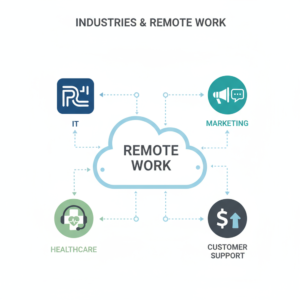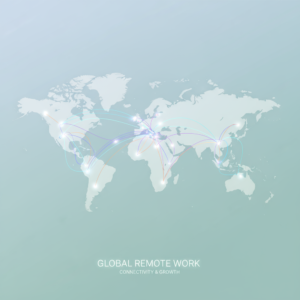By Mithun Srivastava — Automate to Profit |
Disclosure: This article may contain affiliate links. If you purchase through them, we may earn a commission at no extra cost to you. We only recommend tools we would use ourselves
Table of Contents
- Introduction
- The Remote Work Boom in 2025
- Top Industries for Remote Work in 2025
- High-Paying Remote Jobs in 2025
- Work From Home Jobs for Beginners (No Experience Needed)
- Essential Skills for Remote Work Success
- Finding Legitimate Remote Job Opportunities
- Regional Focus: Remote Work Opportunities Across English-Speaking Nations
- Future Outlook: The Evolution of Remote Work Beyond 2025
- Your Next Steps: Seizing Remote Opportunities
- References
Introduction
In an ever-evolving professional landscape, the concept of “work from home” has transcended a temporary trend to become a fundamental pillar of modern employment. As we step into 2025, the allure of remote work is stronger than ever, driven by technological advancements, a global shift in corporate culture, and a persistent demand for flexibility. This comprehensive guide aims to demystify the world of legitimate, high-paying work-from-home opportunities available in the current year. Whether you\”re a seasoned professional seeking a career change or an aspiring remote worker looking for your first virtual role, this article will provide actionable insights, highlight in-demand positions, and equip you with the knowledge to thrive in the remote economy.

The Remote Work Boom in 2025
The narrative surrounding remote work in 2025 is one of sustained growth and strategic integration into global business models. Far from being a fleeting response to past global events, remote and hybrid work arrangements have solidified their position as preferred modes of operation for millions. Data indicates that approximately 22% of the U.S. workforce, equating to a substantial 32.6 million Americans, are now working remotely. This figure underscores a significant societal and economic transformation, highlighting the widespread acceptance and effectiveness of distributed teams.
Globally, the trajectory is equally impressive. Projections suggest that the number of digital jobs capable of being performed remotely is set to reach an astounding 92 million by 2030. This exponential growth is not merely a statistical anomaly; it reflects a fundamental shift in how businesses perceive productivity, talent acquisition, and operational efficiency. Companies are increasingly recognizing the benefits of a remote workforce, including access to a wider talent pool, reduced overhead costs, and enhanced employee satisfaction.

This boom is further fueled by employee preference. A staggering 98% of professionals express a desire to work remotely at least some of the time for the remainder of their careers. This overwhelming preference is rooted in the tangible advantages remote work offers: improved work-life balance, reduced commuting stress, increased autonomy, and often, higher levels of job satisfaction. As such, the remote work landscape in 2025 is not just about where work gets done, but how it contributes to a more flexible, inclusive, and ultimately, more productive global workforce.
Top Industries for Remote Work in 2025

In 2025, several industries stand out as prime territories for remote work, offering a diverse range of opportunities for professionals across various skill sets. These sectors have not only embraced remote models but have also demonstrated a consistent demand for talent, often accompanied by competitive compensation. Understanding these key industries is crucial for anyone looking to navigate the remote job market effectively.
Information Technology (IT)
The IT sector continues to be a powerhouse for remote employment. Its inherent reliance on digital tools and infrastructure makes it perfectly suited for distributed teams. From software development to cybersecurity, IT professionals are in high demand, and many roles offer excellent salaries and benefits. Key remote roles in IT include:
- Software Developer/Engineer: Responsible for designing, developing, and maintaining software applications. Proficiency in programming languages like Python, Java, JavaScript, and C++ is highly valued. Salaries can range from $80,000 to $150,000+ annually, depending on experience and specialization.
- Data Scientist/Analyst: These professionals collect, analyze, and interpret large datasets to help organizations make informed decisions. Strong analytical skills, knowledge of statistical modeling, and experience with tools like R, Python, and SQL are essential. Annual salaries typically fall between $90,000 and $160,000+.
- Cybersecurity Specialist: With the increasing threat of cyberattacks, cybersecurity experts are critical for protecting digital assets. Roles involve identifying vulnerabilities, implementing security measures, and responding to incidents. Expected salaries are often in the range of $95,000 to $170,000+.
- Cloud Architect/Engineer: As more businesses migrate to cloud platforms (AWS, Azure, Google Cloud), professionals who can design, implement, and manage cloud infrastructure are highly sought after. Salaries can reach $120,000 to $180,000+.
Marketing and Digital Media
The digital nature of marketing makes it another fertile ground for remote work. Companies are constantly seeking experts to enhance their online presence, engage with customers, and drive growth through various digital channels. Remote marketing roles are diverse and often project-based, offering flexibility and creative freedom.
- Digital Marketing Manager: Oversees online marketing strategies, including SEO, SEM, social media, content marketing, and email campaigns. A strong understanding of digital analytics and campaign optimization is key. Salaries typically range from $70,000 to $120,000+.
- Content Writer/Strategist: Creates engaging and SEO-friendly content for websites, blogs, social media, and marketing materials. Strong writing, editing, and research skills are paramount. Annual earnings can vary widely, from $50,000 to $90,000+, depending on experience and niche.
- SEO Specialist: Focuses on improving website visibility in search engine results. This role requires expertise in keyword research, on-page and off-page optimization, and technical SEO. Salaries often range from $60,000 to $100,000+.
- Social Media Manager: Manages a company\”s social media presence, develops content strategies, and engages with online communities. Creativity and strong communication skills are essential. Expected salaries are usually between $55,000 and $95,000+.
Healthcare
While many healthcare roles require in-person interaction, the industry has seen a significant expansion of remote opportunities, particularly in administrative, support, and telehealth services. The demand for qualified healthcare professionals remains high, and remote options provide flexibility for both providers and patients.
- Telehealth Nurse/Physician: Provides medical consultations, diagnoses, and treatment plans remotely via video calls or phone. Requires relevant medical licenses and experience. Salaries are comparable to in-person roles, varying widely based on specialization and location.
- Medical Coder/Biller: Translates medical reports into codes used for billing and insurance purposes. Requires certification and attention to detail. Annual salaries typically range from $40,000 to $70,000+.
- Medical Transcriptionist: Converts audio recordings of medical reports into written documents. Accuracy and speed are crucial. Earnings can be project-based or salaried, often between $30,000 and $60,000+.
Customer Support and Service
Customer support roles are a foundational remote work category, offering accessible entry points for individuals without extensive prior experience. Companies across all sectors rely on remote customer service representatives to handle inquiries, resolve issues, and provide support.
- Customer Service Representative: Assists customers with product or service inquiries, technical support, and problem resolution via phone, email, or chat. Strong communication and problem-solving skills are essential. Salaries generally range from $30,000 to $50,000+.
- Technical Support Specialist: Provides remote assistance for technical issues related to software, hardware, or network problems. Requires technical aptitude and patience. Expected salaries are often between $40,000 and $65,000+.
Finance and Accounting
The finance and accounting sectors have increasingly adopted remote work models, particularly for roles that involve data analysis, record-keeping, and financial planning. These positions often require strong analytical skills and attention to detail.
- Accountant/Bookkeeper: Manages financial records, prepares statements, and handles tax preparations for businesses or individuals. Requires accounting qualifications and experience. Salaries typically range from $50,000 to $90,000+.
- Financial Analyst: Conducts financial research, analyzes data, and provides insights to guide investment decisions or business strategies. Strong analytical and quantitative skills are necessary. Annual salaries can range from $60,000 to $110,000+.
These industries represent some of the most robust and rewarding avenues for remote work in 2025, offering a blend of high demand, competitive pay, and the flexibility that modern professionals seek. As the remote work landscape continues to mature, these sectors are likely to remain at the forefront of opportunity.
High-Paying Remote Jobs in 2025

Beyond the general industry trends, certain remote roles consistently command higher salaries due to their specialized skill requirements, strategic importance, and high demand. For those looking to maximize their earning potential while enjoying the flexibility of remote work, these positions represent the pinnacle of opportunity in 2025.
1. Software Development and Engineering
Software developers and engineers remain at the forefront of high-paying remote jobs. Companies across all sectors are in constant need of skilled professionals to build, maintain, and innovate their digital products and services. The ability to code, debug, and develop complex systems is a highly valued asset.
- Average Salary Range: $90,000 – $180,000+ per year
- Key Skills: Proficiency in programming languages (Python, Java, JavaScript, Go, Rust), understanding of data structures and algorithms, experience with cloud platforms (AWS, Azure, GCP), and familiarity with Agile methodologies.
- Why it Pays Well: High demand, specialized technical skills, direct impact on business revenue and efficiency, and continuous innovation in the tech landscape.
2. Data Science and Analytics
In an increasingly data-driven world, data scientists and analysts are indispensable. They extract insights from vast datasets, predict trends, and inform critical business decisions. Their work directly contributes to competitive advantage and strategic growth.
- Average Salary Range: $100,000 – $190,000+ per year
- Key Skills: Strong statistical analysis, machine learning expertise, proficiency in data visualization tools, experience with big data technologies (Hadoop, Spark), and programming skills (Python, R, SQL).
- Why it Pays Well: The ability to translate complex data into actionable business intelligence, scarcity of highly skilled professionals, and the growing importance of data in all industries.
3. Cybersecurity Specialist
As digital threats become more sophisticated, cybersecurity specialists are more crucial than ever. They protect sensitive information, prevent cyberattacks, and ensure the integrity of digital systems. This role carries significant responsibility and requires continuous learning to stay ahead of evolving threats.
- Average Salary Range: $105,000 – $200,000+ per year
- Key Skills: Network security, incident response, vulnerability assessment, ethical hacking, knowledge of security frameworks (NIST, ISO 27001), and relevant certifications (CISSP, CompTIA Security+).
- Why it Pays Well: Critical importance of data protection, high-stakes nature of the work, constant evolution of threats requiring specialized and up-to-date knowledge, and regulatory compliance requirements.
4. Product Management
Remote product managers oversee the entire lifecycle of a product, from conception to launch and beyond. They act as the bridge between various teams (engineering, marketing, sales) and ensure the product meets market needs and business objectives. This role requires a blend of technical understanding, business acumen, and strong leadership.
- Average Salary Range: $95,000 – $170,000+ per year
- Key Skills: Market research, strategic planning, agile methodologies, communication, leadership, and a deep understanding of user experience (UX) and user interface (UI) design principles.
- Why it Pays Well: Direct impact on product success and revenue, cross-functional leadership, and the need for a holistic understanding of both technical and business aspects.
5. Cloud Computing Engineer/Architect
With the widespread adoption of cloud services, professionals who can design, implement, and manage cloud infrastructure are in extremely high demand. This includes expertise in platforms like Amazon Web Services (AWS), Microsoft Azure, and Google Cloud Platform (GCP).
- Average Salary Range: $110,000 – $200,000+ per year
- Key Skills: Cloud platform expertise, infrastructure as code (Terraform, CloudFormation), containerization (Docker, Kubernetes), networking, and security best practices in the cloud.
- Why it Pays Well: The foundational role of cloud infrastructure in modern businesses, the complexity of cloud environments, and the ongoing migration of enterprises to the cloud.
These high-paying remote jobs often require significant experience, specialized education, and continuous professional development. However, for those willing to invest in their skills, they offer unparalleled opportunities for career growth and financial reward in the remote work landscape of 2025.
Work From Home Jobs for Beginners (No Experience Needed)
For many aspiring remote workers, the biggest hurdle is often a lack of prior experience. However, the remote job market in 2025 is surprisingly accessible, offering numerous entry-level positions that require minimal to no experience. These roles are excellent starting points for building a remote career, gaining valuable skills, and understanding the dynamics of working from home.
1. Customer Service Representative
Customer service is one of the most common entry points into remote work. Companies across virtually all industries need representatives to assist customers with inquiries, resolve issues, and provide support. These roles primarily involve communication via phone, email, or chat.
- Typical Responsibilities: Answering customer questions, troubleshooting problems, processing orders or returns, providing information about products or services.
- Required Skills: Excellent communication (written and verbal), active listening, patience, problem-solving abilities, basic computer literacy.
- Average Salary Range: $30,000 – $50,000 per year
- Why it\”s Beginner-Friendly: Many companies provide comprehensive training, focusing on soft skills and product knowledge rather than extensive prior experience.
2. Data Entry Specialist
Data entry roles involve inputting, updating, and maintaining information in various databases or systems. These positions are crucial for businesses that handle large volumes of data and require accuracy and efficiency.
- Typical Responsibilities: Typing information from source documents into computer systems, verifying data accuracy, organizing and maintaining files.
- Required Skills: Fast and accurate typing, attention to detail, basic computer proficiency, ability to follow instructions precisely.
- Average Salary Range: $25,000 – $45,000 per year
- Why it\”s Beginner-Friendly: The primary requirement is often typing speed and accuracy, which can be developed with practice. Many roles are project-based or part-time, offering flexibility.
3. Virtual Assistant (VA)
Virtual assistants provide administrative, technical, or creative assistance to clients remotely. The tasks can vary widely depending on the client\”s needs, making it a versatile role for those looking to develop a broad skill set.
- Typical Responsibilities: Scheduling appointments, managing emails, social media management, content creation, research, data entry, customer support.
- Required Skills: Organization, time management, communication, basic technical skills (e.g., familiarity with office software, social media platforms), adaptability.
- Average Salary Range: $15 – $30 per hour (can vary based on tasks and experience)
- Why it\”s Beginner-Friendly: Many VAs start by offering a few basic services and expand their offerings as they gain experience. Platforms exist to connect new VAs with clients.
4. Online Tutor/Teacher
If you have expertise in a particular subject, online tutoring or teaching can be a rewarding remote opportunity. This can range from teaching English as a second language to tutoring students in specific academic subjects.
- Typical Responsibilities: Delivering lessons, providing feedback, preparing teaching materials, assessing student progress.
- Required Skills: Proficiency in the subject matter, strong communication and teaching skills, patience, basic technical setup for online instruction.
- Average Salary Range: $15 – $50+ per hour (highly dependent on subject, experience, and platform)
- Why it\”s Beginner-Friendly: While some platforms require certifications, many only require subject matter expertise and a passion for teaching. It\”s often flexible and can be done part-time.
5. Transcriptionist
Transcription involves converting audio or video recordings into written text. This role requires excellent listening skills, fast typing, and a good grasp of grammar and punctuation.
- Typical Responsibilities: Listening to audio files and accurately typing out the spoken content, proofreading and editing transcripts.
- Required Skills: Excellent listening comprehension, fast and accurate typing (WPM), strong grammar and punctuation, attention to detail.
- Average Salary Range: $15 – $25 per hour (often paid per audio minute)
- Why it\”s Beginner-Friendly: Many platforms offer entry-level transcription jobs and provide guidelines or style guides to follow. Practice can quickly improve speed and accuracy.
These beginner-friendly remote jobs offer a fantastic entry point into the work-from-home world. They allow individuals to gain practical experience, build a professional network, and develop the discipline and self-management skills essential for long-term success in a remote environment.
Essential Skills for Remote Work Success
Thriving in a remote work environment requires more than just technical proficiency; it demands a unique set of soft skills that enable individuals to be productive, communicative, and self-sufficient outside of a traditional office setting. As remote work continues to evolve in 2025, mastering these essential skills will be paramount for long-term success.
1. Self-Discipline and Time Management
Without the structure of a physical office and direct supervision, remote workers must possess a high degree of self-discipline. This involves the ability to set daily goals, prioritize tasks, and stick to a schedule without external prompting. Effective time management is crucial to avoid procrastination and ensure deadlines are met.
- Tips: Create a daily routine, use productivity tools (e.g., Trello, Asana), set clear boundaries between work and personal life, and take regular breaks to avoid burnout.
2. Communication Skills (Written and Verbal)
Clear and concise communication is vital in a remote setting where face-to-face interactions are limited. Remote workers must be adept at conveying information, ideas, and feedback through various digital channels, including email, chat, video conferencing, and project management platforms.
- Tips: Be explicit and detailed in written communications, actively listen during virtual meetings, confirm understanding, and don\”t hesitate to ask clarifying questions.
3. Adaptability and Flexibility
The remote work landscape is dynamic, with technologies, tools, and team structures constantly evolving. Successful remote workers are adaptable, able to quickly learn new systems, adjust to changing priorities, and embrace new ways of collaborating.
- Tips: Stay open to new technologies, be willing to adjust your work schedule if needed for team collaboration across time zones, and view challenges as opportunities for growth.
4. Problem-Solving and Proactiveness
Remote workers often need to troubleshoot issues independently and take initiative without constant oversight. The ability to identify problems, research solutions, and propose proactive measures is highly valued by employers.
- Tips: Don\”t wait to be told what to do; anticipate needs, seek out solutions, and communicate potential issues along with proposed remedies.
5. Digital Literacy and Tech Savvy
While not always requiring advanced IT skills, a fundamental understanding of common remote work tools and platforms is essential. This includes proficiency with video conferencing software (Zoom, Google Meet), collaboration tools (Slack, Microsoft Teams), cloud storage (Google Drive, Dropbox), and project management software.
- Tips: Familiarize yourself with the tools your company uses, be comfortable with basic troubleshooting, and be willing to learn new software as needed.
6. Collaboration and Teamwork
Despite working remotely, effective collaboration is key to team success. Remote workers must actively participate in virtual team meetings, contribute to shared projects, and build strong relationships with colleagues, even if they never meet in person.
- Tips: Engage actively in team discussions, offer help to colleagues, and use collaborative documents and platforms effectively.
Cultivating these soft skills will not only enhance a remote worker\”s individual performance but also contribute significantly to the overall success and cohesion of their remote team. Employers in 2025 are increasingly prioritizing these attributes, recognizing their critical role in a distributed workforce.
Finding Legitimate Remote Job Opportunities
Navigating the vast landscape of online job postings can be daunting, especially when seeking legitimate work-from-home opportunities. In 2025, while the remote job market is robust, it\”s crucial to know where to look and how to identify credible openings amidst a sea of scams. Here’s a guide to finding authentic remote positions:
1. Reputable Remote Job Boards

Specialized remote job boards are often the best starting point, as they curate listings specifically for remote roles, saving you time and effort. These platforms often vet companies and positions, increasing the likelihood of finding legitimate opportunities.
- FlexJobs: A premium job board that screens all listings to ensure legitimacy. It offers a wide range of remote, hybrid, and flexible jobs across various industries. While it requires a subscription, the quality and vetting of jobs often justify the cost.
- Remote.co: This site offers a comprehensive list of remote jobs, resources, and insights into remote work. It features roles in customer service, design, development, HR, marketing, and more.
- We Work Remotely: One of the largest remote job communities, featuring opportunities in tech, design, marketing, and other fields. It\”s known for its high-quality, fully remote positions.
- Virtual Vocations: Another curated job board that focuses exclusively on telecommuting jobs. They manually vet every job posting to ensure it\”s legitimate and scam-free.
- LinkedIn: While not exclusively remote, LinkedIn allows for powerful filtering by “remote” location. It\”s also an excellent platform for professional networking and direct outreach to recruiters.
2. Company Websites and Career Pages
Many companies, especially those with a strong remote-first culture, list their open positions directly on their own career pages. If you have specific companies in mind that you admire or whose values align with yours, check their websites regularly.
- How to Search: Visit the company\”s official website and look for sections like “Careers,” “Jobs,” “About Us,” or “Work With Us.” Many will have a dedicated remote or distributed team section.
- Benefits: Applying directly can sometimes give you an edge, and you can gain a deeper understanding of the company\”s culture and remote work policies.
3. Professional Networking
Networking remains a powerful tool for job searching, even in the remote world. Connections can lead to referrals, insider information about openings, and mentorship opportunities.
- Online Communities: Join remote work communities on platforms like Slack, Facebook Groups, or Reddit (e.g., r/remotework, r/workfromhome). These communities often share job leads, advice, and support.
- Industry-Specific Forums: Participate in forums or online groups related to your specific industry. Many niche communities have job boards or discussions about remote opportunities.
- Informational Interviews: Connect with people already working in remote roles or at remote-first companies. Ask about their experiences, how they found their jobs, and if they know of any openings.
4. Freelance Platforms (for project-based work)
If you\”re looking for project-based remote work or want to build experience, freelance platforms can be a good option. While not always full-time employment, they can provide a steady stream of income and valuable portfolio pieces.
- Upwork: A popular platform for freelancers across various industries, from writing and design to development and virtual assistance.
- Fiverr: Known for its “gig”-based services, where freelancers offer specific services at set prices.
- Toptal: Focuses on connecting top freelance talent (developers, designers, finance experts) with companies for high-end projects.
Tips for a Successful Remote Job Search:
- Tailor Your Resume and Cover Letter: Highlight skills relevant to remote work, such as self-discipline, communication, and digital literacy.
- Optimize Your Online Presence: Ensure your LinkedIn profile is up-to-date and showcases your remote-friendly skills and experience.
- Beware of Scams: Be wary of job offers that seem too good to be true, ask for personal financial information upfront, or require payment for training or equipment. Legitimate companies will not ask you to pay to get a job.
- Prepare for Remote Interviews: Practice video interviews, ensure your internet connection is stable, and have a professional background.
By focusing on reputable sources and employing strategic search techniques, you can significantly increase your chances of landing a legitimate and rewarding work-from-home job in 2025.
Regional Focus: Remote Work Opportunities Across English-Speaking Nations

The global nature of remote work means that opportunities are not confined by geographical borders. In 2025, several English-speaking countries stand out as hubs for remote employment, each offering unique advantages and a robust job market for those seeking work-from-home roles.
United States (USA)
The USA remains the largest market for remote work, driven by a strong tech sector, a culture of innovation, and a high adoption rate of flexible work policies. Major cities like San Francisco, New York, and Seattle continue to be centers for remote tech jobs, but opportunities are distributed nationwide. The demand for software developers, data scientists, cybersecurity experts, and digital marketers is particularly high. Companies often offer competitive salaries and comprehensive benefits packages.
Canada
Canada\”s remote job market is steadily growing, with a focus on technology, healthcare, and finance. Cities like Toronto, Vancouver, and Montreal are emerging as significant tech hubs, contributing to a rising number of remote positions. The Canadian government has also been supportive of remote work initiatives, making it an attractive option for both domestic and international remote workers. Roles in IT support, virtual assistance, and content creation are readily available.
United Kingdom (UK)
The UK has a mature remote work landscape, especially in London and other major cities, but with opportunities spanning the entire country. The financial services, tech, and creative industries are strong drivers of remote employment. The demand for project managers, business analysts, and various IT roles remains consistent. The UK\”s flexible working regulations also make it an appealing location for remote professionals.
Australia
Australia\”s remote work scene is expanding, particularly in its major metropolitan areas like Sydney and Melbourne. The country offers a good work-life balance and a growing number of remote roles in IT, marketing, and customer service. There\”s a particular emphasis on cloud-based solutions and digital transformation, leading to demand for cloud engineers and digital marketing specialists.
India
India is a rapidly growing hub for remote work, especially in the IT and BPO (Business Process Outsourcing) sectors. With a large pool of skilled English-speaking professionals, India offers numerous opportunities in software development, data entry, customer support, and transcription. Many global companies are leveraging India\”s talent for remote operations, making it a significant market for entry-level and experienced remote roles.
Other English-Speaking Countries
Beyond these major players, other English-speaking nations also offer compelling remote work opportunities:
- Ireland: Known for its thriving tech sector and as a European headquarters for many multinational corporations, Ireland offers remote roles in IT, sales, and customer support.
- New Zealand: With a strong focus on work-life balance and a growing tech industry, New Zealand provides remote opportunities in software development, design, and digital marketing.
- South Africa: The country\”s growing tech scene and a large English-speaking population contribute to remote roles in IT, customer service, and content creation.
When seeking remote work in these regions, it\”s important to consider time zone differences, local labor laws, and cultural nuances. However, the increasing global acceptance of remote work means that geographical location is becoming less of a barrier to finding rewarding employment.
Future Outlook: The Evolution of Remote Work Beyond 2025

As we look beyond 2025, the trajectory of remote work points towards continued evolution and integration into the global economy. The initial surge driven by necessity has matured into a strategic advantage for businesses and a preferred lifestyle for employees. Several key trends are expected to shape the future of work-from-home opportunities.
1. Hybrid Models Will Dominate
While fully remote companies will continue to thrive, the most prevalent model is likely to be hybrid work. This approach offers the best of both worlds: the flexibility and autonomy of remote work combined with the benefits of in-person collaboration and team building. Companies will increasingly fine-tune their hybrid strategies to optimize for productivity, employee well-being, and innovation.
2. Focus on Digital Nomadism and Global Talent Pools
The rise of digital nomad visas and a greater acceptance of remote work will empower more professionals to work from anywhere in the world. This will further expand global talent pools, allowing companies to recruit the best candidates regardless of their physical location. This trend will also necessitate a deeper understanding of international labor laws, taxation, and cultural nuances.
3. AI and Automation Will Reshape Roles
Artificial intelligence and automation will continue to transform job roles, particularly those involving repetitive tasks. While some entry-level remote jobs may be impacted, AI will also create new opportunities, especially in areas like AI training, data annotation, and AI-powered tool development and management. Remote workers will need to continuously upskill and reskill to remain competitive.
4. Emphasis on Upskilling and Reskilling
The rapid pace of technological change and the evolving demands of the remote workforce will place a greater emphasis on continuous learning. Online courses, certifications, and micro-credentials will become even more critical for professionals looking to adapt to new tools, methodologies, and industry trends. Companies will likely invest more in employee training and development programs.
5. Enhanced Remote Work Technologies
Innovation in remote work technologies will continue to improve the efficiency and experience of working from home. This includes more sophisticated collaboration platforms, immersive virtual reality (VR) and augmented reality (AR) tools for meetings and training, and advanced cybersecurity solutions to protect distributed networks. These advancements will make remote work even more seamless and secure.
6. Greater Focus on Employee Well-being
As remote work becomes more entrenched, companies will increasingly prioritize the mental health and well-being of their remote employees. This will manifest in more robust support systems, flexible working hours, initiatives to combat isolation, and a greater emphasis on work-life integration rather than just balance.
The future of remote work is bright and dynamic. It promises a more flexible, globally connected, and technologically advanced professional landscape. For individuals, this means a continuous need for adaptability, lifelong learning, and a proactive approach to career development. For businesses, it signifies an ongoing opportunity to tap into diverse talent, foster innovation, and build resilient, distributed teams.
Your Next Steps: Seizing Remote Opportunities
The landscape of work-from-home jobs in 2025 is rich with opportunity, offering pathways to fulfilling and well-compensated careers for individuals across all experience levels. From high-paying tech roles to accessible entry-level positions, the remote economy is here to stay and continues to expand globally.
To successfully navigate this dynamic environment, remember to:
- Identify Your Niche: Understand which industries and roles align with your skills and career aspirations.
- Develop Essential Skills: Cultivate self-discipline, strong communication, adaptability, and digital literacy.
- Utilize Reputable Resources: Leverage specialized remote job boards and company career pages to find legitimate opportunities.
- Network Actively: Connect with professionals and join online communities to uncover hidden job leads and gain insights.
- Stay Updated: The remote work world is constantly evolving; continuous learning is key to long-term success.
Your journey into the world of legitimate work-from-home jobs starts now. With the right approach, dedication, and a commitment to continuous growth, you can unlock a flexible, rewarding, and prosperous career from the comfort of your home.
References
[1] https://www.statista.com/statistics/1271612/share-of-employees-working-remotely-in-the-us/
[3] https://www.mckinsey.com/featured-insights/future-of-work/the-future-of-work-in-2025-and-beyond
[4] https://www.flexjobs.com/blog/post/remote-work-statistics/
[6] https://weworkremotely.com/

We are a professional full-service transportation company and we provide the best party transportation in Abu dhabi, Sharjah, and Dubai.